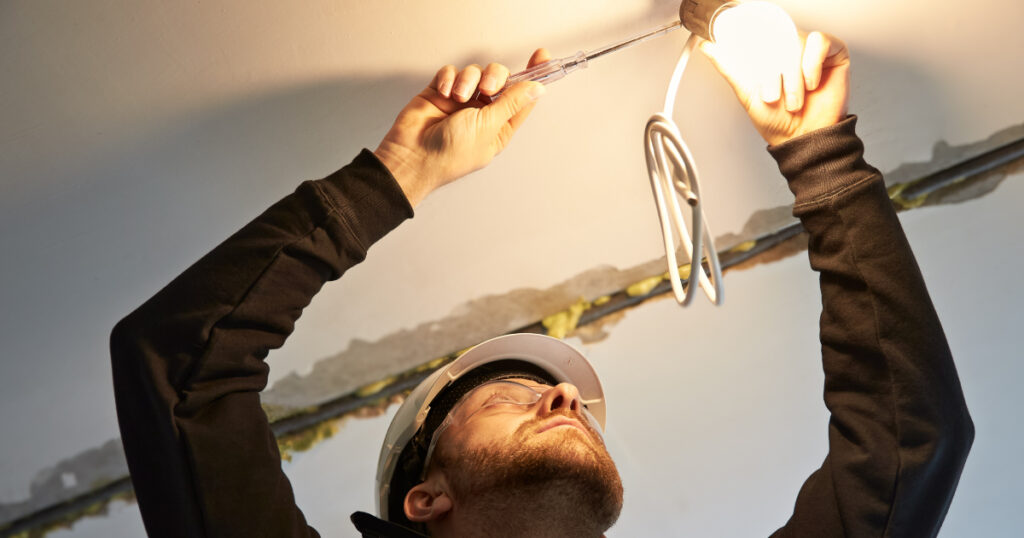Don’t let one mistake burn through your business’s finances.
Electrical contractors keep the lights on and the power pulsing through the Alberta economy. It’s an essential but hazardous trade that requires careful risk management and insurance selection.
Whether you’re troubleshooting a faulty circuit, installing new wiring or maintaining electrical systems, accidents can happen. Tools can be stolen, wiring can malfunction and cause a power outage or fire, or you could suffer an electrical burn or crash your van on the way to a job site. Without insurance, these incidents could lead to major financial loss, legal challenges and damage to your professional reputation.
In Alberta, electrical contractors face diverse legal requirements and risks depending on their province and type of work. But the right insurance package can ensure you’re prepared for the unexpected. Here are six types of insurance every electrical contractor in Alberta should know about.
1. Commercial general liability insurance (CGL) for electrical contractors
CGL protects you if your work causes bodily injury or property damage to customers or others outside your company. For instance, if a fire starts due to a malfunction of wiring you installed, your CGL policy could cover the property damage and associated legal costs. Likewise, if a client trips over tools you left on the job site and gets injured, your CGL policy could cover their medical expenses and any resulting lawsuit.
Most project owners hiring electrical contractors will ask for proof of liability insurance before awarding a contract. Most provincial regulatory bodies also require electrical contractors to hold liability insurance to obtain licensing. In Ontario, for example, the Electrical Safety Authority requires electrical contractors to carry liability insurance to obtain a license. The minimum coverage is typically $2 million. Similar licensing requirements are enforced by Technical Safety BC, the Alberta Safety Codes Authority and the Régie dubâtiment du Québec.
2. Errors and omissions (E&O) insurance for electrical contractors
Even the most highly skilled electrical contractors can make mistakes. E&O insurance, also called professionalliability insurance, can protect you if your customer claims your work was negligent and caused bodily harm orproperty damage. For example, if you overlook a faulty outlet during an inspection and it later causes a fire, this policy could cover legal fees and damages. However, it does not usually pay to rectify your mistakes.
3. Tools and equipment insurance for electrical contractors
Tools and equipment insurance covers those assets for theft, loss or damage. For instance, if your tools arestolen from a job site or your vehicle overnight, this insurance will mitigate the replacement costs. It will alsocover damage to essential tools caused by accidents, fires or extreme weather.
4. Commercial auto insurance
Any vehicle you use to transport yourself, workers, tools or materials to and from job sites must be covered by commercial auto insurance. This insurance covers accidents, injuries to others and vehicle damage that occurswhile you’re driving for work purposes. Your personal auto policy will not cover your vehicle while it’s beingused in this way.
Remember that provinces may have different rules for insuring work vehicles. If you’re not sure whatcommercial auto coverage you need, talk to an insurance broker familiar with provincial laws who can guide you through the insurance requirements in your area.
5. Commercial property insurance
Commercial property insurance helps safeguard your business against various losses to physical assets. Forexample, if you own or rent an office, workshop, or storage facility, this insurance will cover damages causedby fire, water, theft, or vandalism at that property. It can also protect equipment and inventory stored withinthat property. In some cases, it may be a condition for licensing.
6. Workers’ compensation
As an electrical contractor, you may manage a team of electricians. In most provinces, this means you will haveto purchase workers’ compensation insurance from your local workers’ compensation board.
Workers’ compensation insurance covers medical expenses, lost wages and rehabilitation costs if an employee is injured on the job. Failure to carry it can lead to penalties or legal liabilities. The respective workers’ compensation board in your province or territory has specific rules and premium calculations that your insurance must comply with.
A comprehensive insurance package tailored to your needs as an electrician or electrical contractor can beyour safety net. It can protect your business and professional reputation, and provide peace of mind in a demanding profession.







